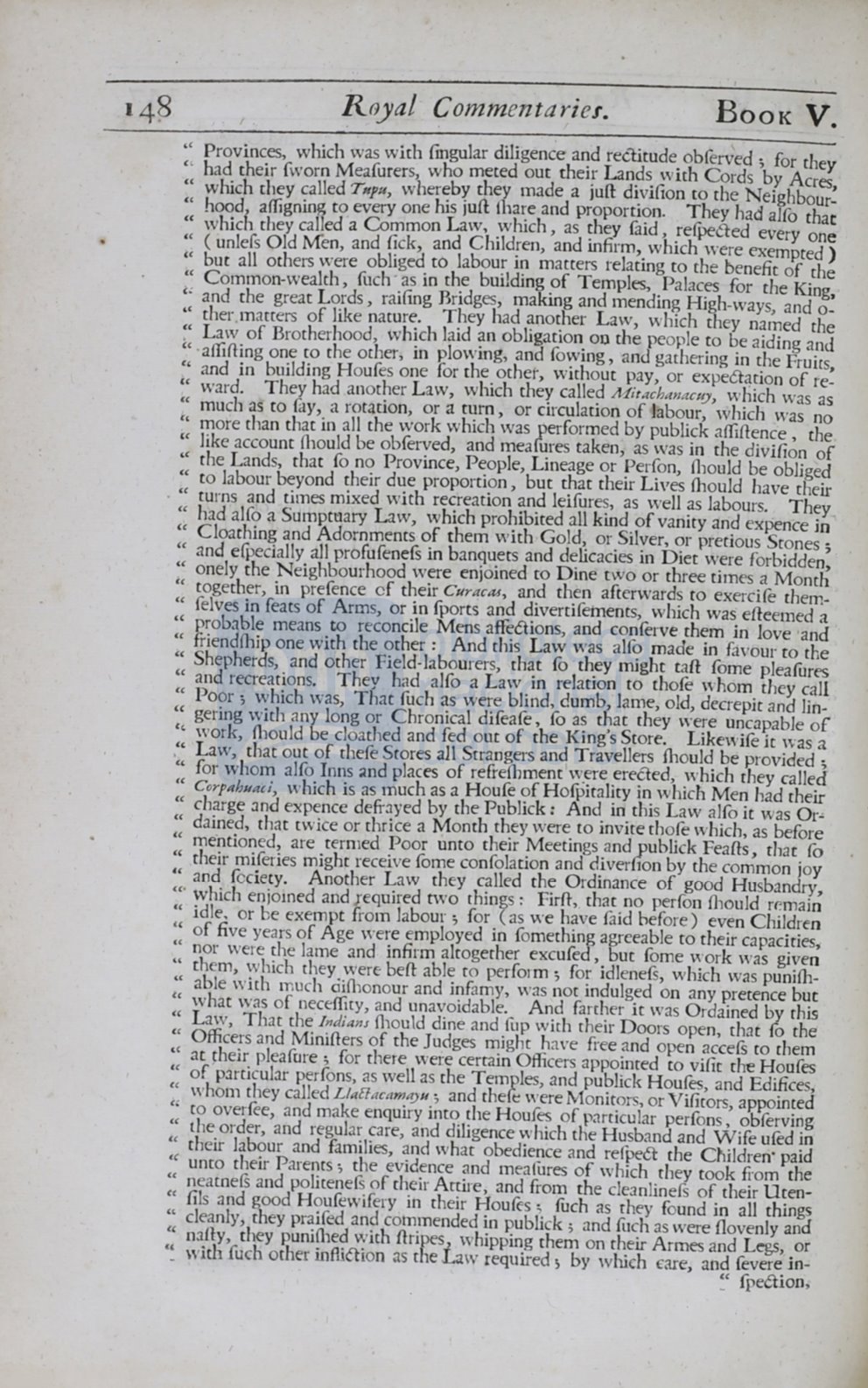

I
.
Royal
Commentarier.
BooK
V.
'' Provinces, which was with fingular diligence
a~d
reditude. obferved; for they
' · had their [worn Meafurers, who mered out their Lands
ith
Cords by Acres
cc
which they called
Tupu,
wher~b¥
they made
a juft
di_vifion
co
the Neighbour:
'' hood, affigoing to every one his
JUfr
!ha~e
and proport1?n· They had
alfo
that
cc
\'
hich
they called
a
Common Law, which, as they fa1d,
retpetted
every one
" ( unlefs Old Men, and fick, and Children, and
infirm,
which \Vere exempted)
cc
but all others were obliged to labour
in
matters relating to the benefit of the
cc
Common-wealth, fuch as in the building of Temples, Palaces for the King
c.:
and the great Lords, railing Bridges, making and mending High-v ays, and
0
~
'' ther marrers of like nature.
They had another
La ,
which they named the
cc
Law of Brotherhood,
which
laid an obligation oo the people to be aiding and
" ailifiiog one
co
the other,
in
plowing, and fowing, and gathering in the Fruics,
c,
and in building Houfes one
for
the other, without pay, or expeetation of te–
cc
ward. They had another Law, which they called
Mitachanacuy,
v.
hich was as
" much as to
fay,
a rotation, or a turn, or circulation of labour, which was no
c,
more than chat in
all
the work which was performed by publick affifi:ence , the
'' like account !hould be obferved, and meafores taken,
as
was in the divifion
of
'' the Lands, that
fo
no Province, People, Lineage or Perfon, !bould be obliged
cc
to labour beyond their due proportion, but that their Lives iliould have their
" turns and
times
mixed
V\
ith recreation and leifures, as well
as
labours. They
cc
had alfo
a
Sumprnary
Law,
which prohibited
all
kind of vanity
and
expence
jn
" Cloathing and Adornments of them"' ith Gold, or Silver, or pretious
tones~
.
'' and
efi~ecially
all
profufenefs
in
banquets and delicacies in Diet were forbidden,
" onely the Neighbourhood were enjoined ro Dine t o or three times a Mondi
" together, in prefence cf their
CuractU,
and then afterwards ro exercife chem..
" [elves in feats of Arms, or
in
[ports and divertifements, which was efieemed
a
'' probable means to reconcile Mens affeetions, and conferve them in love and
" friendiliip one with the other : And this Law was alfo made in favour to the
~c
Shepherds, and ocher Field-labourers, that
fo
they might
tall:
fome pleafures
" and recreations. They had alfo a Law in relation
to
thofe whom they call
" Poor; which was, That fuch
as
were blind, dumb, lame, old, decrepit and lin-
" gering with any long or Chronical difeafe, fo
as
that they \Vere uncapabJe of
c,
''or.I{, !hould be doathed and fed out of the King's Store. Likewife
it
lvas
a
'' Law, that out of rhefe Stores all Strangers and Travellers iliould be provided
?
cc
for
whom alfo Inns
~nd
places of refrefhment
~~ere
ereeted, which they called
"
CorpahHaci,
which is as much
as
a Houfe of Hofpitality in
hich Men had their
" charge
:md
expence defrayed by the Publick: And in this
Law
alfo
it
as
Or-
" dained, chat twice or thrice a Month they were to invite thofe which, as before
cc
mentioned, are termed Poor unto their Meetings and publick Feafis, that
(o
'' their miferies might recei e fame confolation and diverfion by the common joy
'' and fociecy. Another Law they called the Ordinance of good Husbandry,
«
which
enjoined and required two things: Firfi, that no perfon
ili~u]d
r<:rnain
" idle.. or be exempt from labour ; for (as we ha e faid before) even Children
" of five years of Age were employed in fomething agreeable to their capacities,
" nor
ere the lame and infirm altogether excufed , but forne .work
\Vas
given
'
them,
hich they
ere befi able
to
perform ;
for
idlenefs, which was puniih-
" able
with much
ciHhonour and infamy, was not indulged on any pretence but
l e
what\ ·as of neceffity,
and una
oidable. And farther
it
was Ordained by
this
cc
La\', That the
Indians
0100\d dine and fop with their Doors open, that
fo
the
cc
Officers and Minifiers of the Judges might have free and open acce!S
to
them
'' at
their
pleafore ; for there
ere certain Officer a pointed to vifit the Houf
es
cc
of particular perfons, as
well
as the Temples, and publick Houfes, and Edifices,
" \''hom they call d
Llailacamtl_)·11;
and thefe \:\ere Monitor , or VHitors, appointed
c:
to o erfee, and make enquiry into the Houf
es
of particular perfon , obferving
" the
order, and regular care, and diligence which the Husband and Wife ufed in
" their Jabour and families, and \ hat obedience and refpeet the Children· paid
" umo their Parents; the e idence and rneafures of which they took from che
cc
neatnefs and politenef of their Attire, and from the c ean
ine!~
of their Uten-
" fils and good H oufewifery
in
their Houfes;
foch
as they found in
all
things
" cleanly, they praifed and commended
in
publi
k;
and fuch as
ere flovenly
and
" naHy, they unifhed with firipes, whip ing them on their Armes and Legs, or
~
with
fuch orhe ·
ff
etion
as the
\
required ;
by
which
are,
and
fevere
in–
~'
:fi
eCtion,














